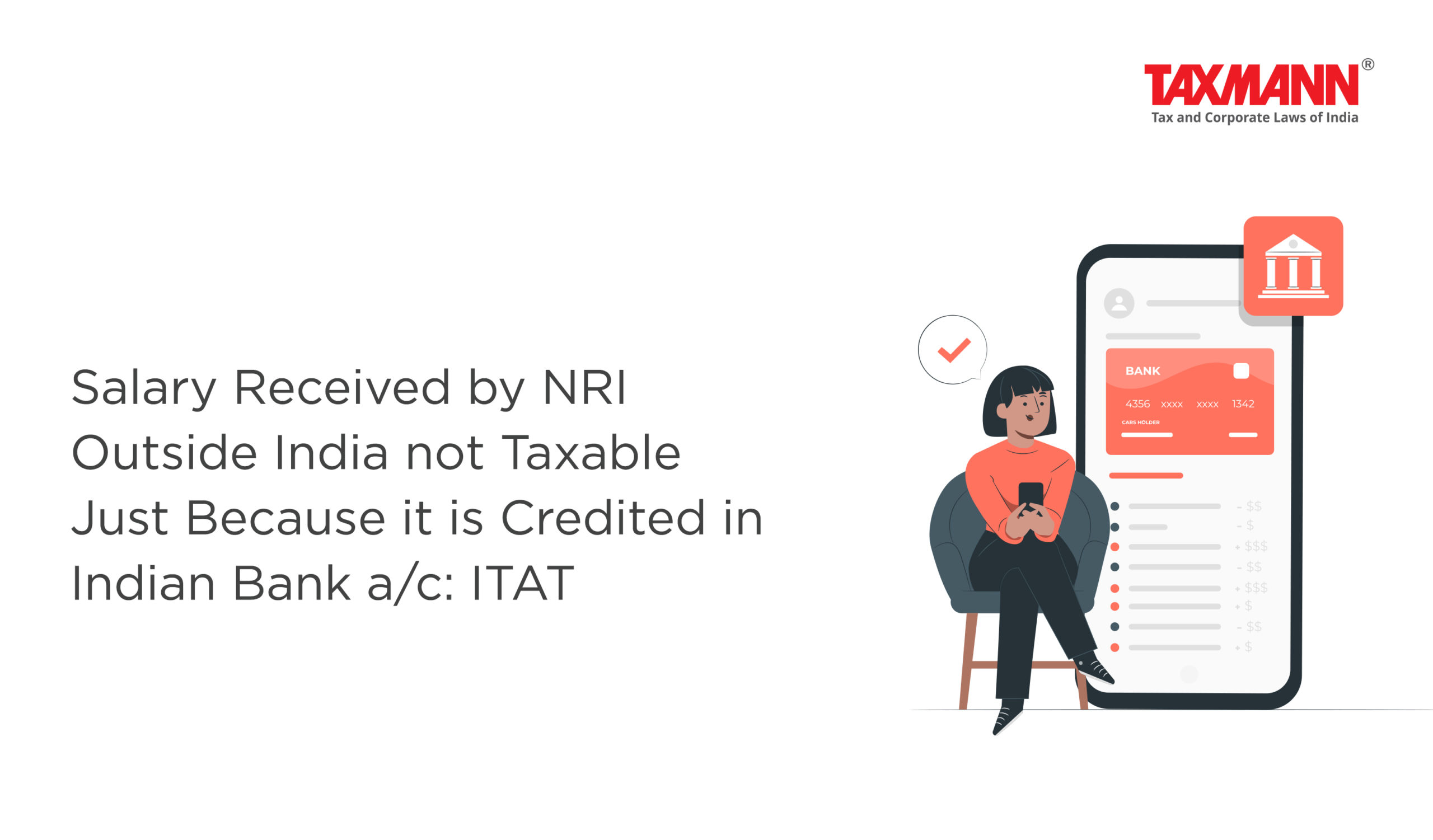Salary Received by NRI Outside India not Taxable Just Because it is Credited in Indian Bank a/c: ITAT
- Blog|News|International Tax|
- 2 Min Read
- By Taxmann
- |
- Last Updated on 27 May, 2023

Case Details: Prasanth Nandanuru v. Income-tax Officer (International Taxation)-2 - [2023] 150 taxmann.com 183 (Hyderabad-Trib.)
Judiciary and Counsel Details
-
- Rama Kanta Panda, Accountant Member & K. Narasimha Chary, Judicial Member
- Hiten Chande, AR for the Appellant.
- Jeevan Lal Lavidiya, CIT-DR for the Respondent.
Facts of the Case
Assessee, an individual, was an employee of Wells Fargo (EGS) India Pvt. Ltd (“Wells India”) and was sent on a short-term assignment to Wells Fargo Bank N.A., USA (Wells USA). Later, he was directly employed by Wells USA. During his short-term assignment to Wells USA, the assessee made on the payrolls of Wells India. His salary for the services rendered was credited to his Indian bank account by Wells India after deducting tax at source.
Assessee claimed that he was a tax resident of the USA and, therefore, eligible to avail the provisions of the India-US Double Taxation Avoidance Agreement (DTAA). He claimed that the income earned from services rendered in the USA was only taxable in the USA and not in India.
Assessing Officer (AO) held that even if the assessee was a non-resident, his salary income in India would be governed by the Income-tax Act. The Dispute Resolution Panel (DRP) approved the AO’s order. Aggrieved-assessee preferred an appeal to the Hyderabad Tribunal.
ITAT Held
The Tribunal followed the decision of AAR in the case of British Gas India (P.) Ltd. [2006] 157 Taxman 225 (AAR – New Delhi), wherein it held that the salary received in India by the employees of the Indian entity seconded to the foreign entity is no doubt taxable in India under the provisions of section 5(2)(a).
However, as per Article 4(1) of the Indo-US DTAA, the term ‘resident of contracting state’ includes a resident, and, Article 16(1) of the DTAA mandates that in respect of the salaries derived by a resident of the USA in respect of an employment shall be payable only in the USA. Therefore, because of residence in the USA, the assessee is liable to income tax in the USA regarding the salary he derived from his employment in the USA.
Consequently, though the provision under section 5(2)(a) fastens tax liability on the assessee, but because of the overriding effect of section 90, Article 16 of the DTAA would prevail over the 5(2)(a) of the Act. Thus, the salary received by the assessee in India for the services rendered in the USA was not liable to tax in India.
List of Cases Reviewed
-
- British Gas India (P.) Ltd., In re [2006] 157 Taxman 225/287 ITR 462 (para 8)followed.
List of Cases Referred to
-
- British Gas India (P.) Ltd., In re [2006] 157 Taxman 225/287 ITR 462 (AAR – New Delhi) (para 8)
- Union of India v. Azadi Bachao Aadolan [2003] 132 Taxman 373/263 ITR 706 (SC) (para 13)
- CIT v. P.V.A.L Kulandagan Chettiar [2004] 137 Taxman 460/267 ITR 654 (SC) (para 13)
- CIT v. Cooper Engg. Ltd. [1968] 68 ITR 457 (Bom.) (para 13)
- AL Nisr Publishing v. CIT [1999] 105 Taxman 308/239 ITR 879 (AAR) (para 13).
Disclaimer: The content/information published on the website is only for general information of the user and shall not be construed as legal advice. While the Taxmann has exercised reasonable efforts to ensure the veracity of information/content published, Taxmann shall be under no liability in any manner whatsoever for incorrect information, if any.

Taxmann Publications has a dedicated in-house Research & Editorial Team. This team consists of a team of Chartered Accountants, Company Secretaries, and Lawyers. This team works under the guidance and supervision of editor-in-chief Mr Rakesh Bhargava.
The Research and Editorial Team is responsible for developing reliable and accurate content for the readers. The team follows the six-sigma approach to achieve the benchmark of zero error in its publications and research platforms. The team ensures that the following publication guidelines are thoroughly followed while developing the content:
- The statutory material is obtained only from the authorized and reliable sources
- All the latest developments in the judicial and legislative fields are covered
- Prepare the analytical write-ups on current, controversial, and important issues to help the readers to understand the concept and its implications
- Every content published by Taxmann is complete, accurate and lucid
- All evidence-based statements are supported with proper reference to Section, Circular No., Notification No. or citations
- The golden rules of grammar, style and consistency are thoroughly followed
- Font and size that’s easy to read and remain consistent across all imprint and digital publications are applied



 CA | CS | CMA
CA | CS | CMA

This article is beneficial for NRI taxpayers! NRI Legal Services often deal with such cases—it’s important to clarify taxation laws for income earned abroad. Great insights shared!